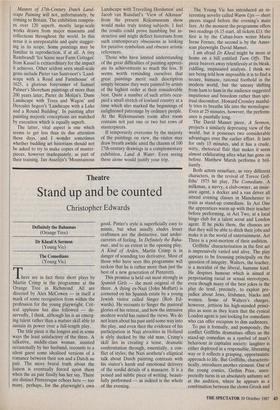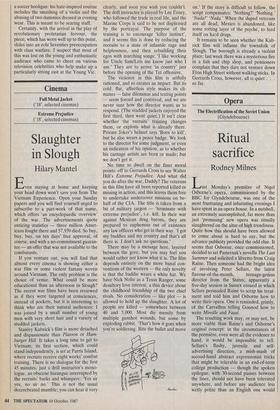Theatre
Stand up and be counted
Christopher Edwards
Definitely the Bahamas (Orange Tree) Dr Kheal/A Sermon (Young Vic) The Comedians (Young Vic) here are in fact three short plays by Martin Crimp in the programme at the Orange Tree in Richmond. All are directed by Alex McCowen — in itself a mark of some recognition from within the profession for the young playwright. Crit- ical applause has also followed — de- servedly, I think, although his is an emerg- ing talent rather than a mature skill able to sustain its power over a full-length play.
The title piece is the longest and in some ways the least satisfactory of the three. A talkative, middle-class woman, assisted occasionally by her husband, recounts to a silent guest some idealised versions of a romance between their son and a Dutch au pair. The more brutal truth about the liaison is eventually forced upon them when the au pair finally has her say. There are distinct Pinteresque echoes here — too many, perhaps, for the playwright's own good. Pinter's style is superficially easy to mimic, but what usually eludes lesser craftsmen are the distinctive, taut under- currents of feeling. In Definitely the Baha- mas, and to an extent in the opening play, A Kind of Arden, Martin Crimp is in danger of sounding too derivative. Most of those who have seen this programme will reckon that he is rather more than just the best of a new generation of Pinteretti.
This promise is held out most strongly in Spanish Girls — the most original of the three. A dying ex-Nazi (John Moffatt) is cornered on his Spanish estate by a young Jewish visitor called Singer (Rob Ed- wards). He recounts to Singer the pastoral glories of his retreat, and how the intrusive modern world has ruined the views. We do not learn about his past until some way into the play, and even then the evidence of his participation in Nazi atrocities in Holland is slyly ducked by the old man. Crimp's skill lies in creating a tense, dramatic confrontation through, essentially, a con- flict of styles; the Nazi aesthete's elliptical talk about Dutch painting contrasts with his visitor's harsh and emotional delivery of the sordid details of a massacre. It is a poised and subtle piece of writing, beauti- fully performed — as indeed is the whole of the evening. The Young Vic has introduced an in- teresting novelty called Warm Ups — short pieces staged before the evening's main fare. At the moment the programme offers two readings (6.15 start, all tickets f1): the first is by the Cuban-born writer Maria Irene Fornes; the second is by the Amer- ican playwright David Mamet.
I am afraid Dr Kheal might be more at home on a bill entitled Turn Offs. The piece beavers away relentlessly at its bleak, riddling, inspissated analysis. I think we are being told how impossible it is to find a secure, humane, rational foothold in the modern world, but the uneasy shifting from ham to ham in the audience suggested impatience and boredom rather than spir- itual discomfort. Howard Crossley manful- ly tries to breathe life into the monologue. Even at 25 minutes, however, the perform- ance is painfully long.
The David Mamet piece, A Sermon, projects a similarly depressing view of the world, but it possesses two considerable advantages over the earlier effort. It lasts for only 15 minutes, and it has a crude, witty, rhetorical flair that makes it seem almost exhilarating after what has gone on before. Matthew Marsh performs it bril- liantly.
Both actors resurface, as very different characters, in the revival of Trevor Grif- fiths' 1975 hit play, The Comedians. A milkman, a navvy, a club-owner, an insur- ance agent, a docker and a van driver all attend evening classes in Manchester to train as stand-up comedians. In Act One the apprentices warm up with their teacher before performing, in Act Two, at a local bingo club for a talent scout and London agent. If he picks them, the chances are that they will be able to ditch their jobs and make it in the world of entertainment. Act Three is a post-mortem of their audition.
Griffiths' characterisation in the first act is impressively varied and alive. The play appears to be focussing principally on the question of integrity. Walters, the teacher, is a moralist of the liberal, humane kind. He despises humour which is aimed at perpetuating racial or sexual stereotypes, even though many of the best jokes in the play do tend, precisely, to exploit pre- judice about Jews, Irishmen, blacks and women. Some of Walters's charges, however, jettison his high-minded princi- ples as soon as they learn that the cynical London agent is just looking for comedians who can offer escapism to dim audiences.
To put it formally, and pompously, the conflict Griffiths dramatises offers us the stand-up comedian as a symbol of man's behaviour in capitalist society: laughter is either deployed in a responsible, liberating way or it reflects a grasping, opportunistic approach to life. But Griffiths, characteris- tically, introduces another element. One of the young comics, Gethin Price, unex- pectedly turns in an absolutely unfunny act at the audition, where he appears as a combination between the clown Grock and a soccer hooligan: his hate-inspired routine includes the smashing of a violin and the abusing of two dummies dressed in evening wear. This is meant to be searing stuff.
Certainly, with the arrival in the play of revolutionary proletarian fervour, the piece, which has worn well up to this point, slides into an echt Seventies preoccupation with class warfare. I suspect that most of this was lost on the young and enthusiastic audience who came to cheer on various television celebrities who help make up a particularly strong cast at the Young Vic.



























































 Previous page
Previous page